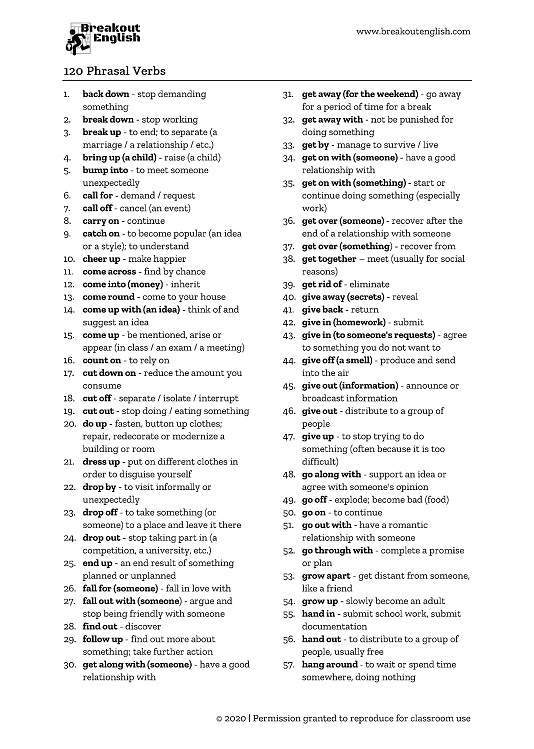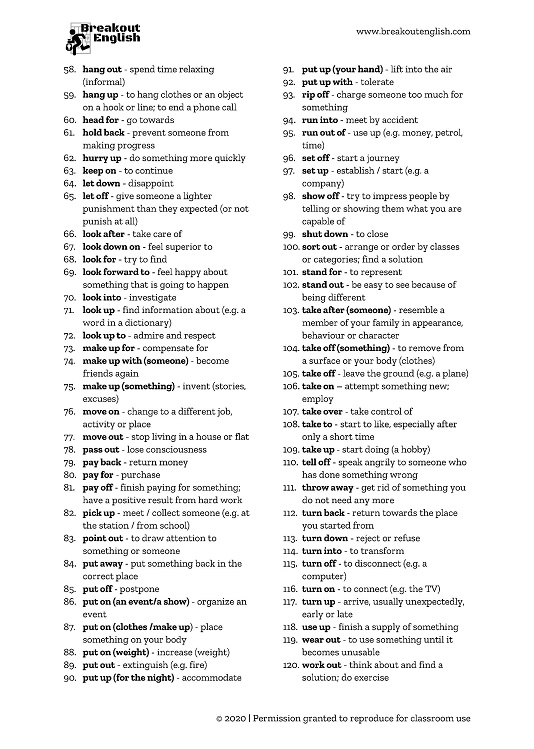Phrasal verbs are one of the love to hate them areas of the English language, but love them or hate them, they are a vital area to understand before taking an exam, hence this list of phrasal verbs. As you progress through levels of exams, especially Cambridge exams, you’ll notice phrasal verbs coming up more and more often. At A2 you’ll see useful phrasal verbs such as wake up, by B1 you will start to see common phrasal verbs like find out, when you get to B2 you’ll be expected to know less frequent phrasal verbs such as call off, and in C1 you’ll be expected to not only understand, but to use a wide variety of essential phrasal verbs with ease. With our comprehensive phrasal verbs list below, you’ll find the 120 most useful ones which every B2 or C1 student should know.

Contents
What are phrasal verbs?
Phrasal verbs, for those who may be unfamiliar, are multi-word verbs that consist of a base verb and one or more particles, which together create a new meaning. They are a unique and essential aspect of the English language and are widely used in both casual conversation and writing.
From a grammatical perspective, phrasal verbs can function as either transitive or intransitive verbs, depending on the meaning they convey. Transitive phrasal verbs require an object, while intransitive phrasal verbs do not. For example, “take off” is a transitive phrasal verb that requires an object, as in “take off your shoes.” On the other hand, “wake up” is an intransitive phrasal verb, as in “I woke up early this morning.” There is no direct object connected to the verb “wake up”.
Phrasal verbs can also have different meanings depending on the context in which they are used. This is because the particles that make up phrasal verbs can change the meaning of the base verb. For example, “look up” can mean to search for information, as in “I’m going to look up the meaning of that word.” However, “look up” can also mean to raise your eyes or head, as in “She looked up at the sky.”
It’s worth mentioning that some phrasal verbs can consist of two particles, adding even more complexity to the meaning they convey. These double-particle phrasal verbs can be challenging to understand and use correctly, but with practice, they can greatly enhance your language skills. For example, the phrasal verb “look up to” means to admire or respect someone, as in “I look up to my father for his wisdom and kindness.” The two particles work together to create a new meaning that is distinct from the meanings of the individual words.
So, why is it important to learn phrasal verbs? Including phrasal verbs in your conversations and writing can greatly enhance your language skills and make you sound more confident and fluent in English. It’s a fantastic way to showcase your mastery of the language and leave a lasting impression on others.

How to use the phrasal verbs list in the classroom
Here are a few simple, but effective, activities to use with phrasal verbs in the classroom:
- Phrasal verb pictionary – The fact that phrasal verbs are delexicalised makes them perfect for pictionary. Students will have to stretch their imaginations to draw the words separately or together. *Working in a socially distant or online classroom? No problem, use mini-whiteboards or online whiteboards to keep this essential classroom game alive.
- Phrasal verb taboo – Everyone’s favourite, taboo works amazingly with phrasal verbs. Phrasal verbs often have a Latinate synonym or a phrase that explains the meaning. These synonyms come in handy when you later need phrasal verbs for an exam.
- Make your own transformations – Think of the solution sentence that uses a phrasal verb, then think of a synonymous sentence. Using the preposition as the key word, would you be able to recreate the key word transformation using the phrasal verb?
- Story time – Think of a story from your life and write it out using as many phrasal verbs as possible. Then test phrasal verb knowledge by cutting them out of the story and seeing if you can recreate it.
- True or false – Write 5 sentences about yourself using the phrasal verbs list. Can others guess what is true and what is false?
But how are phrasal verbs connect to English exams? In Cambridge exams, you’re likely to see them come up in the Use of English paper. Here are 10 key word transformation questions using phrasal verbs. Just because phrasal verbs get you down, doesn’t mean you shouldn’t pick up your game.
Phrasal verbs list
Here’s our 120 most useful phrasal verbs list. These verbs have come from years of exams, classes, course books and students who have struggled with this language. The list of phrasal verbs is also available on Quizlet to use as self-study or to practise in class.
Tim’s Free Lesson Plans has designed a useful Quizlet set with this list of phrasal verbs with missing prepositions. Check it out here!
Download
If you can use all of these verbs, consider yourself an expert. Here’s the list of phrasal verbs in a downloadable pdf.


List of phrasal verbs
- back down – stop demanding something
- break down – stop working
- break up – to end; to separate (a marriage / a relationship / etc.)
- bring up (a child) – raise (a child)
- bump into – to meet someone unexpectedly
- call for – demand / request
- call off – cancel (an event)
- carry on – continue
- catch on – to become popular (an idea or a style); to understand
- cheer up – make happier
- come across – find by chance
- come into (money) – inherit
- come round – come to your house
- come up with (an idea) – think of and suggest an idea
- come up – be mentioned, arise or appear (in class / an exam / a meeting)
- count on – to rely on
- cut down on – reduce the amount you consume
- cut off – separate / isolate / interrupt
- cut out – stop doing / eating something
- do up – fasten, button up clothes; repair, redecorate or modernize a building or room
- dress up – put on different clothes in order to disguise yourself
- drop by – to visit informally or unexpectedly
- drop off – to take something (or someone) to a place and leave it there
- drop out – stop taking part in (a competition, a university, etc.)
- end up – an end result of something planned or unplanned
- fall for (someone) – fall in love with
- fall out with (someone) – argue and stop being friendly with someone
- find out – discover
- follow up – find out more about something; take further action
- get along with (someone) – have a good relationship with
- get away (for the weekend) – go away for a period of time for a break
- get away with – not be punished for doing something
- get by – manage to survive / live
- get on with (someone) – have a good relationship with
- get on with (something) – start or continue doing something (especially work)
- get over (someone) – recover after the end of a relationship with someone
- get over (something) – recover from
- get together – meet (usually for social reasons)
- get rid of – eliminate
- give away (secrets) – reveal
- give back – return
- give in (homework) – submit
- give in (to someone’s requests) – agree to something you do not want to
- give off (a smell) – produce and send into the air
- give out (information) – announce or broadcast information
- give out – distribute to a group of people
- give up – to stop trying to do something (often because it is too difficult)
- go along with – support an idea or agree with someone’s opinion
- go off – explode; become bad (food)
- go on – to continue
- go out with – have a romantic relationship with someone
- go through with – complete a promise or plan
- grow apart – get distant from someone, like a friend
- grow up – slowly become an adult
- hand in – submit school work, submit documentation
- hand out – to distribute to a group of people, usually free
- hang around – to wait or spend time somewhere, doing nothing
- hang out – spend time relaxing (informal)
- hang up – to hang clothes or an object on a hook or line; to end a phone call
- head for – go towards
- hold back – prevent someone from making progress
- hurry up – do something more quickly
- keep on – to continue
- let down – disappoint
- let off – give someone a lighter punishment than they expected (or not punish at all)
- look after – take care of
- look down on – feel superior to
- look for – try to find
- look forward to – feel happy about something that is going to happen
- look into – investigate
- look up – find information about (e.g. a word in a dictionary)
- look up to – admire and respect
- make up for – compensate for
- make up with (someone) – become friends again
- make up (something) – invent (stories, excuses)
- move on – change to a different job, activity or place
- move out – stop living in a house or flat
- pass out – lose consciousness
- pay back – return money
- pay for – purchase
- pay off – finish paying for something; have a positive result from hard work
- pick up – meet / collect someone (e.g. at the station / from school)
- point out – to draw attention to something or someone
- put away – put something back in the correct place
- put off – postpone
- put on (an event/a show) – organize an event
- put on (clothes /make up) – place something on your body
- put on (weight) – increase (weight)
- put out – extinguish (e.g. fire)
- put up (for the night) – accommodate
- put up (your hand) – lift into the air
- put up with – tolerate
- rip off – charge someone too much for something
- run into – meet by accident
- run out of – use up (e.g. money, petrol, time)
- set off – start a journey
- set up – establish / start (e.g. a company)
- show off – try to impress people by telling or showing them what you are capable of
- shut down – to close
- sort out – arrange or order by classes or categories; find a solution
- stand for – to represent
- stand out – be easy to see because of being different
- take after (someone) – resemble a member of your family in appearance, behaviour or character
- take off (something) – to remove from a surface or your body (clothes)
- take off – leave the ground (e.g. a plane)
- take on – attempt something new; employ
- take over – take control of
- take to – start to like, especially after only a short time
- take up – start doing (a hobby)
- tell off – speak angrily to someone who has done something wrong
- throw away – get rid of something you do not need any more
- turn back – return towards the place you started from
- turn down – reject or refuse
- turn into – to transform
- turn off – to disconnect (e.g. a computer)
- turn on – to connect (e.g. the TV)
- turn up – arrive, usually unexpectedly, early or late
- use up – finish a supply of something
- wear out – to use something until it becomes unusable
- work out – think about and find a solution; do exercise


excellent post
Top notch!